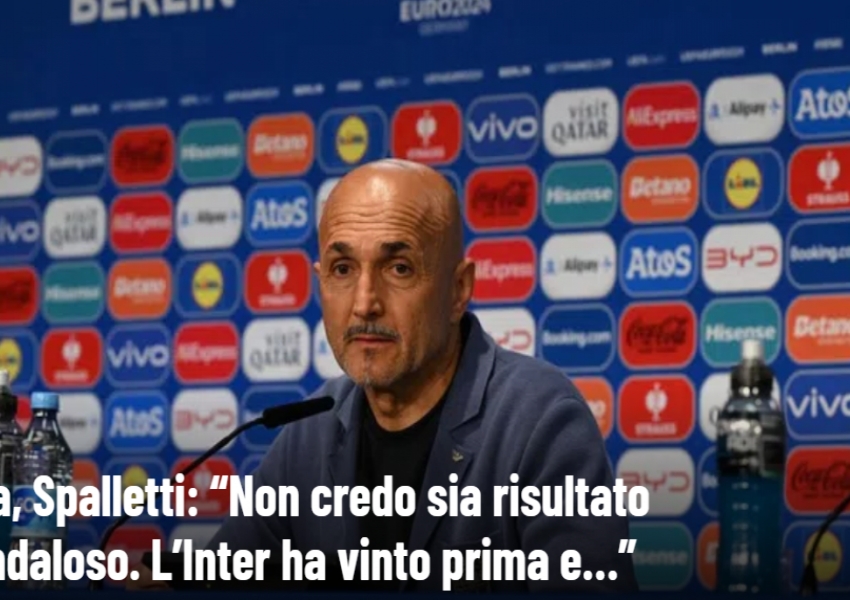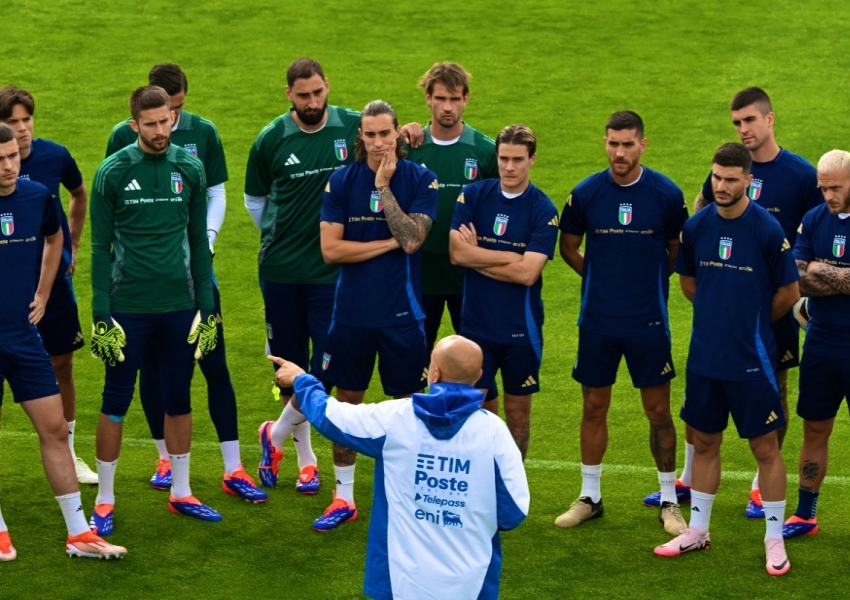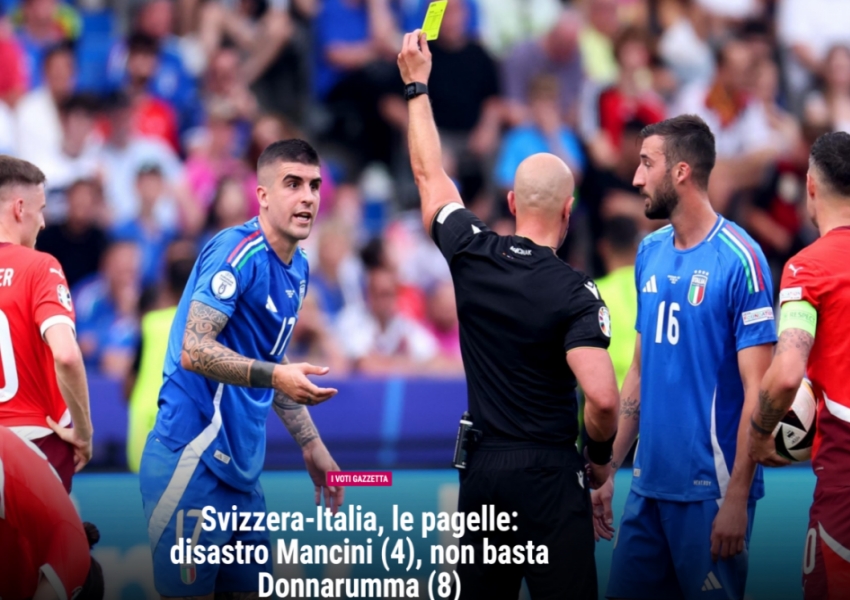Italy's Best Player Reveals True Culprit with Four Major Sins: Draconian Discipline Becomes a Laughingstock
In the wake of Italy's early exit from Euro 2024, the Italian media have found a rare point of unity: criticism of coach Luciano Spalletti. His tenure has sparked unprecedented consensus among millions of Italians, uniting them in their disappointment and frustration. This unity of criticism is a rare phenomenon in a country where diverse opinions typically abound. Prominent Italian media outlets and tactical experts have pinpointed four major failings of Spalletti, which they argue led to Italy's downfall.

First Sin: Grandstanding
Spalletti’s approach has been accused of being more about style than substance. The Italian media have harshly criticized his tactical setups, describing them as overly complex and ineffective. Despite his reputation, Spalletti's tactical adjustments seemed to hinder rather than help his players. Commentator He Wei famously quipped, "Italy is slower than my courier delivery," highlighting the sluggishness and lack of creativity in Italy's play.

Throughout the tournament, Italy conceded first in all four matches, a clear indication that Spalletti’s initial game plans were consistently outmaneuvered by opposing coaches. The necessity for mid-game corrections only emphasized his failure to set up his team correctly from the start. Furthermore, Spalletti’s insistence on adhering to his preferred 4-3-3 formation, despite having a roster better suited to a 3-5-2 setup, baffled both fans and pundits alike.

Spalletti’s most notable contributions came during press conferences, where his confrontational style and willingness to deflect blame—often towards Inter Milan—were more prominent than his tactical acumen. His ability to generate headlines and create a media frenzy earned him high marks for showmanship but did nothing to enhance Italy’s performance on the pitch.
Second Sin: Misleading Perceptions
The notion that Italy’s failure was solely due to a lack of talent has been strongly refuted by experts like Beppe Bergomi. Bergomi dismissed claims that no coach could have succeeded with the current squad, pointing to the significant achievements of Italian players at club level. For instance, five players reached the Champions League final with Inter Milan, two players made it to the Europa League final with AS Roma, and Gianluca Scamacca won back-to-back European titles.
The disparity in quality between Italy’s players and their opponents was starkly evident. Comparing individual matchups, it was clear that players like Federico Chiesa and Scamacca were not outclassed by their adversaries. Yet, many players were deployed in unsuitable positions, limiting their effectiveness. Bergomi’s critique centered on the mismanagement of player roles and positions, which led to underperformance on the international stage.
The only player to consistently excel was goalkeeper Gianluigi Donnarumma, who was rightly recognized as the team’s standout performer. His excellence underscored the argument that, when used correctly, Italy’s players were more than capable of competing at the highest level. Donnarumma’s success contrasted sharply with the struggles of his outfield teammates, who were hampered by tactical mismanagement.
Third Sin: Fear of the Opposition
Former coach Fabio Capello highlighted the importance of courage in advancing through the tournament, a quality he found lacking in Spalletti’s Italy. Capello lamented the team’s cautious and timid approach, particularly when trailing. Italy’s most vibrant periods of play occurred only when they were desperate—such as in the final 70 minutes against Albania and the moments following Luka Modrić’s goal for Croatia.
During these periods, the players took it upon themselves to attack, disregarding Spalletti’s conservative instructions. This self-driven offensive was in stark contrast to the rest of their play, which was characterized by hesitation and an overemphasis on defense. Spalletti’s cautious tactics stifled the team’s natural attacking instincts, leading to a lack of dynamism and flair.
This fearfulness has been a hallmark of Spalletti’s career, particularly in high-stakes matches. His teams have often struggled in European competitions and derbies, where his apprehensive approach has led to poor results. Critics argue that his inherent conservatism, deeply ingrained in his coaching philosophy, has repeatedly undermined his teams in crucial moments.
Fourth Sin: Stifling Joy
Football is as much about emotion and spirit as it is about tactics. Spalletti’s draconian rules off the pitch severely impacted the players’ morale and performance. His stringent regulations included bans on video games, late-night card games, and social media use. However, the most detrimental rules were the prohibition of jokes among players and the imposition of long periods of enforced inactivity before matches.
These measures created an oppressive atmosphere, draining the players of joy and spontaneity. The prohibition on playful interactions stifled camaraderie, while the extended periods of confinement before games heightened anxiety and mental fatigue. As a result, players who were typically vibrant and spirited at their clubs appeared dour and lethargic in the national team setup.
The impact of these draconian measures was evident on the field. Players like Nicolò Barella, usually a source of energy and enthusiasm, frequently displayed frustration. The typically jovial and spirited players from clubs like Inter Milan, Juventus, Roma, and Atalanta seemed weighed down by the oppressive environment. Their lack of joy and freedom translated into a lackluster and uninspired performance during the matches.
Analysis of Italy's Failings
Italy’s early exit from Euro 2024 cannot be solely attributed to a lack of talent. The squad boasted several players with proven success at the highest levels of club football. The real issue lay in the management and tactical approach of Spalletti. His failure to adapt his tactics to suit the strengths of his players, combined with his conservative approach and oppressive off-field rules, were the primary reasons for Italy’s underperformance.
Spalletti’s insistence on rigid tactical schemes and his inability to set up his team effectively from the start of matches were significant flaws. His grandstanding in the media further alienated fans and players alike, while his mismanagement of player roles prevented the team from reaching its potential. His fear-driven tactics stifled the team’s natural attacking instincts, and his draconian discipline rules crushed the players’ spirits.
Moving Forward
For Italy to regain its former glory, a comprehensive reassessment of their coaching philosophy and team management is essential. The next coach must be capable of adapting tactics to suit the strengths of the squad and fostering a positive and motivating environment. Encouraging a more flexible and dynamic style of play, combined with a supportive and joyful atmosphere, will be crucial in unlocking the full potential of the players.
Italy’s rich footballing tradition demands a return to the principles of creativity, courage, and joy. By learning from the mistakes of Spalletti’s tenure, the national team can rebuild and reestablish itself as a force in international football. The unity in criticism of Spalletti may be rare, but it underscores the collective desire for a brighter future for Italian football.
Copyright Statement:
Author: mrfootballer
Source: Mrfootballer
The copyright of this article belongs to the author. Reproduction is not allowed without permission.
Recommended Blog
- Euro 2024 Round of 16: Can England Capitalize on Their Bracket? Spain Displaying Championship Caliber
- Argentina Finds Its Strongest Lautaro in Five Years: The Leading Golden Boot Contender! Why Has His Impact Tripled?
- Inter Milan Civil War Ignites in Euro Knockout Stages: Switzerland’s Secret Weapon Against Spalletti
- Euro 2024 Group E Final Round: Romania Poised to Leverage Technical Edge, Belgium's Unsettling Atmosphere
- Euro 2024 Group D Final Round: Should the Netherlands Trust Depay? France and Poland Await Star Players' Starts
- Inter Milan's Defensive Star Tops Key Euro 2024 Rankings: From Mascot to Mainstay in Three Years
- Inter Milan's Chief Scouts Rising Swiss Star: A €30 Million Transfer Saga Unfolds
- Final Round of Euro 2024 Group B: Italy's Golden Opportunity, Spain's Rotation Strategy
- Final Round of Euro 2024 Group A: Germany's Declining Form, Scotland's Spirited Battle Against Hungary
- Inter's Justification for Hakan Çalhanoğlu's €70 Million Valuation: Rejecting a €20 Million Annual Offer
Hot Blog
- Champions League Quarterfinals Set: Arsenal Crush PSV 9-3, Villa Dominate Brugge 6-1! Real Madrid vs. Arsenal Confirmed
- Champions League Drama: Rare Penalty Violation! VAR’s Eagle Eye Turns 60,000 Cheers to Silence
- Vinícius Jr. Misses Crucial Penalty as Atlético Fans Erupt – Bellingham Offers Consolation in Madrid Derby Thriller
- Champions League Quarterfinals Set to Take Shape – Arsenal and Villa Poised to Advance, Real Madrid in Strong Position, Dortmund Facing an Uphill Battle
- Real Madrid Survive Atlético Thriller: Win 4-2 on Penalties to Set Up Quarterfinal Clash with Arsenal
- 1-4! 0-4! A Dark 24 Hours for Chinese Football – Shanghai’s Giants Humiliated and Eliminated from the AFC Champions League
- 4 AM Showdown: Manchester United’s Do-or-Die Battle – Defeat Means Elimination and a Trophyless Season
- Man City’s 21-Year-Old Star Returns Home as a Hero! Receives $350,000 Mercedes, Gifts It to His Father
- AFC Champions League Quarterfinal Draw: Yokohama Faces CR7! Two High-Stakes Clashes as Japan’s Duo Battle in the Bottom Half
- Barça Unleashed: 26-Minute, 4-Goal Comeback Stuns Atlético as Flick’s Masterclass Makes History